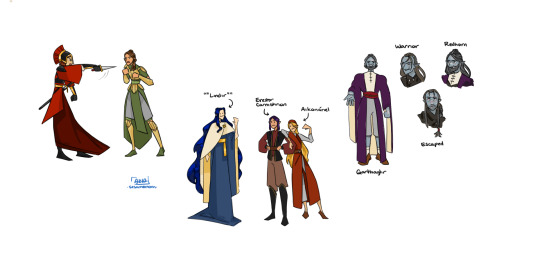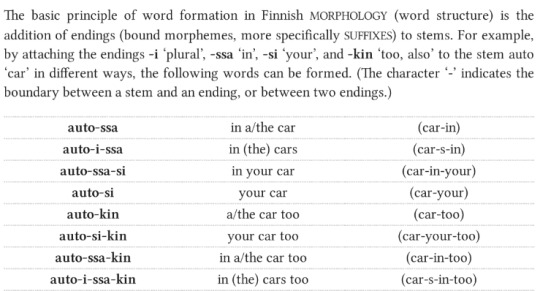#linguistics is cool :-)
Text
As much as I adore conlangs, I really like how the Imperial Radch books handle language. The book is entirely in English but you're constantly aware that you're reading a "translation," both of the Radchaai language Breq speaks as default, and also the various other languages she encounters. We don't hear the words but we hear her fretting about terms of address (the beloathed gendering on Nilt) and concepts that do or don't translate (Awn switching out of Radchaai when she needs a language where "citizen," "civilized," and "Radchaai person" aren't all the same word) and noting people's registers and accents. The snatches of lyrics we hear don't scan or rhyme--even, and this is what sells it to me, the real-world songs with English lyrics, which get the same "literal translation" style as everything else--because we aren't hearing the actual words, we're hearing Breq's understanding of what they mean. I think it's a cool way to acknowledge linguistic complexity and some of the difficulties of multilingual/multicultural communication, which of course becomes a larger theme when we get to the plot with the Presgar Translators.
#imperial radch#also a great example of the 'you don't have to be Tolkien' phenomenon#if you want to think about linguistic differences by building all the languages in your setting#and being able to explain what those differences are through actual texts in the language in question#that's AWESOME#but it's not the only way to do it#it's also interesting because of course this style only works in book form#everyone's speaking different languages but in a written account they're all 'translated' for you#but of course if it was a TV series they would all have to be speaking a language the audience understands#(or you *would* have to go wild with conlangs)#and i think that's really cool as well--#how for a series where song is so central we don't actually hear any of the actual in-universe words or any of the music#it's all been filtered#and again you know this is happening but seeing the examples of how real songs--the shape hymns and 'L'homme Arme'--are presented#makes you a lot more viscerally aware of how limited your perspective is#it's good#ann leckie i love you
2K notes
·
View notes
Text
heartbreaking: this viral post is saying things you completely agree with in the most irritating way possible
#mumbling#goD#thinking about that one cringing = pearl clutching post i saw a while ago#legitimately good points and the only time i’ve ever seen someone point out the linguistic shift#of ‘cringe’ going from verb to adjective and how that takes the blame off of the people DOING the cringing#like yeah! that’s it that’s the thing i’ve been trying to figure out how to say!!#the insidious shift from cringe as an action of the beholder to a property of the beheld is not only worth examining#but demonstrates a seriously important way our brains can be affected over time by language#that was something i didn’t even notice! sure it bothered me but i didn’t know how to express WHY#and i think it’s so cool to see someone finally manage to articulate smth that’s been pissing me off for years#HOWEVER#my god was op’s phrasing annoying the hell out of me for some reason#just written in such a grating writing style i couldn’t bring myself to reblog it even though i really wanted to
1K notes
·
View notes
Text
what i like especially about the pronouns in the goblin emperor is that this language doesn't just have the T-V distinction (aka informal vs. formal second-person pronouns, in this case 'thou' vs. 'you'), it also has informal and formal first-person pronouns. having BOTH of these distinctions in the same language lets you fine-tune your tone by mixing and matching. with only one axis of formality, when you use informal pronouns, are you being familiar in an intimate way, or in an insolent or dismissive way? when you use formal pronouns, are you being polite or standoffish? you can't tell just from the pronouns; there's ambiguity. but a language where you can use a formal first-person pronoun in the same sentence as an informal second-person pronoun allows you to distance yourself (via the formal first) while also being familiar (via the informal second), thereby achieving the conversational tenor known to linguists as Fuck Thee Specifically.
#just kidding i don't know what linguists call that tenor. or any tenors. i'm not totally positive what a tenor even is#but i can't let that stop me from writing a jokey post on tumblr dot com#register is a very interesting area of linguistics that i know very little about#so i'm probably revealing the depths of my vast ignorance here to all the sociolinguists who surely hang on my every word#but i've always thought of the formal/informal pronoun thing as being about two things: intimacy-distance & rudeness-politeness#and of course you can usually tell from context whether a formal pronoun is meant to indicate distance or politeness#(plus distance and politeness are related to each other (to various degrees depending on culture))#but it seems like it would be cool to have a built-in alignment chart of sorts just for pronoun combos#instead of prep jock nerd goth...why not try intimate self-effacing polite superior?#the goblin emperor#pronouns#register#sociolinguistics#my posts#f#anyway i know i said i wasn't going to reread the goblin emperor...but guess what. lol#and i edited my tags on that earlier post but fyi the language DOES distinguish between plural and formal singular pronouns#i had said i thought it used the same pronouns for plural and formal but i just wasn't paying close enough attention#so anyway i just reread the part where maia is talking to setheris in formal first and informal second#and you can see setheris going ohhh shit. oh shit oh shit oh shit#i'm in biiiiiig trouble#you sure are dude. that's the Time to Grovel signal#it's interesting because at the very beginning of the book when i first saw the formal first used i just thought it was the royal we#because i knew the main character was supposed to be royalty#but then EVERYONE was doing it. so it's not the royal we it's just the formal we#however. this does make me realize that the way the royal we would function in a language that retains the t-v distinction#is the same way i'm describing here. it's just reserving that particular tone (i'm better than you and am displeased with you)#for royalty only. which makes sense given royalty's whole deal
814 notes
·
View notes
Text

i am not immune to the being struck by a feeling of romanticism from a required linguistic anthopology reading
#personal post#deborah tannen is just. i think my favorite author i've ever had to read for class.#i think it would be so cool to listen to a lecture of hers#linguistics
273 notes
·
View notes
Text

Various inhabitants of rivendell
(inspired by @thesummerestsolstice here and here)
#silm#silmarillion#lotr#rivendell#maglor#erestor#i hope you do not mind me borrowing garthaglir like a particularly cool rock on the playground#i imagine glorfindels arrival at rivendell like#he walks into the library and runs into garthaglir#both of them scream#but then later glorfindel sat him down and taught him to do fancy braids#now they are friends#later he was part of the redhorn pass search and rescue team out of loyalty to the people who took him in#(bonus points if he was originally a caradhras orc...)#he has joined glorfindel in Team Hair Down During Battle and elrond is so tired#although later he teaches elrond the local dialect of black speech#they spend weeks in the library transcribing texts and poring over the etymology of particularly quenya-derived words#orcs are kind of undead (see: aure entuluva battle) and elrond is weird and somewhat maiarin#somebody eventually forces them to go take a break after three weeks of nonstop linguistics-bonding#feanors ghost is Proud#(he also is glad that erestor eventually befriended lindir because hey! thats one grandkid who didnt disown everyone)#the one old feanorion and thingols guard both refuse to modernize their armor#elrohir is like 'you know mail is a thing now right?? leg armor has existed for two ages and youre still wearing your fancy battle robes'#to which both of them will yell something only vaguely understandable about modern armor being poorly made#and then proceed to fight about whose armor was actually more effective at the dagor nuin giliath#(theyre that old)
158 notes
·
View notes
Text
Strange word, he thought. It's one of those words that described something that does not make a noise but if it did make a noise would sound just like that. Bliss. It's like the sound of a soft meringue melting gently on a warm plate.
Terry Pratchett, The Truth
I've been looking for a word for words like this (because there are a lot of them) since college (a long time ago) and I'm here to tell you that I've finally got it:
notomatopoeia
please start using it immediately thank you
#in retrospect it's so obvious#onomatopoeia#notomatopoeia#discworld#terry pratchett#gnu terry pratchett#discworld the truth#sing-you-fools#language#linguistics#coining new words for the hell of it#adding more tags because i want this to catch on#words#cool words#poetry
355 notes
·
View notes
Text
The Sanscrit language, whatever be its antiquity, is of a wonderful structure; more perfect than the Greek, more copious than the Latin, and more exquisitely refined than either, yet bearing to both of them a stronger affinity, both in the roots of verbs and the forms of grammar, than could possibly have been produced by accident; so strong indeed, that no philologer could examine them all three, without believing them to have sprung from some common source, which, perhaps, no longer exists; there is a similar reason, though not quite so forcible, for supposing that both the Gothic and the Celtic, though blended with a very different idiom, had the same origin with the Sanscrit; and the old Persian might be added to the same family.
—Sir William Jones, 1786, in his Third Anniversary Discourse for the Asiatic Society
111 notes
·
View notes
Text
if you are 22 or younger, remember: however embarrassingly cringy you find slang and turns of phrase used by people older than you, YOUR cool hip internet-speak and cultural signifiers will undergo the same transformation under the scrutiny of the next generation 5 or 6 years from now and you won't know it's happened until some edgy 16 year old tells you to light yourself on fire for using it. it is the circle of life and it humbles us all.
#railing against older folks for saying words you find embarrassing just bc they are older#is part of establishing both your personal and sociolinguistic identity#which is healthy! every generation does it#however as this happens in your formative years some of your own slang/generational signifiers will stick and carry on into adulthood#much like minerals forming underneath cooling magma#and then you too will be cringy and embarrassing according to a fresh set of kids finding their own identities#and if we are all cringe then nobody is#that's the beauty of it! that's the beauty#point is if you can accept and embrace this then you are far less likely to be rude to kids and teens when you're older#sept 2022#linguistics
2K notes
·
View notes
Text
look at this!

it's a stylistic mix of japanese script and arabic script! it looks so cool!!
#i noticed when i watched the first ep but i havent seen any post about it. it's so cool!!#bucchigiri#bucchigiri?!#anime#animanga#linguistics#languages#language#japanese#arabic#farsi#persian#linguistics tag#moralgayness
124 notes
·
View notes
Text
who’s hotter?
one shirtless esc 2023 champ with a bowl cut

(photo cred https://www.facebook.com/CristinaGregoriPhotos)
or the morphology of his language

#linguistics#finnish#kaarija#käärijä#suomi#shut up finnish is so fucking cool??#idk what i'm more obsessed with#none of this is going to help me write my dissertation or prep for classes next year#but it just might keep me alive long enough to finish a dissertation
156 notes
·
View notes
Text
i love learning etymology. came across the word sarcophagus today and despite knowing what it meant, i’d never thought much about the word itself. and i looked at it for a second and was like hold on. i know phagós means ‘eating.’ so what exactly does ‘sarco-’ mean??? looked it up and learned that it comes from the greek word sárx which means ‘flesh’. so the word literally means ‘flesh-eating’, and it originally referred to a type of limestone that was used to make coffins because it was thought to have chemical properties that helped speed up the decomposition process — i.e. ‘flesh-eating stone’.
71 notes
·
View notes
Text
Articulatory Phonetics - 调音语音学
字音 zǐyīn - (n.) consonant (also 福音 fǔyīn)
调音部位diàoyīnbùwèi - (n.) place of articulation (also 发音部位)
双唇音 shuāngchúnyīn - (n.) bilabial sound
唇齿音/齿唇音 chúnchǐyīn/chǐchúnyīn - (n.) labiodental sound
齿音 chǐyīn - (n.) dental sound
齿龈音 chǐyínyīn - (n.) alveolar sound
龈腭音 yín'èyīn - (n.) alveolo-palatal sound
卷舌音 juǎnshéyīn - (n.) retroflex sound
腭音 èyīn - (n.) palatal sound
软腭音 ruǎn'èyīn - (n.) velar sound
小舌音 xiǎoshéyīn - (n.) uvular sound
咽音 yānyīn - (n.) pharyngeal sound
声门音/喉音 shēngményīn/hóuyīn - (n.) glottal sound
调音方法 diàoyīnfāngfǎ - (n.) manner of articulation
阻碍音 zǔ'àiyīn - (n.) obstruent
塞音 sèyīn - (n.) stop, plosive
擦音 cāyīn - (n.) fricative
咝音 sīyīn - (n.) sibilant
塞擦音 sècāyīn - (n.) affricate
响音 xiǎngyīn - (n.) sonorant
鼻音 bíyīn - (n.) nasal
流音 liúyīn - (n.) liquid
边音 biānyīn - (n.) lateral
近音 jìnyīn - (n.) approximant
半元音bànyuányīn - (n.) semivowel, glide
颤音 chànyīn - (n.) trill
弹音 tányīn - (n.) tap
闪音 shǎnyīn - (n.) flap
发声态 fāshēngtài - (n.) phonation
清音 qīngyīn - (n.) voiceless sound
浊音 zhuóyīn (n.) voiced sound
送气音 sòngqìyīn - (n.) aspirated sound
不送气音 búsòngqìyīn - (n.) unaspirated sound (also 非送气音)
发声起始时间 fāshēngqǐshǐshíjiān - (n.) voice-onset time (VOT)
元音 yuányīn - (n.) vowel
元音高度 yuányīn gāodù - (n.) vowel height
元音舌位 yuányīn shéwèi - (n.) vowel backness
前元音 qiányuányīn - (n.) front vowel
央元音 yāngyuányīn - (n.) central vowel
后元音 hòuyuányīn - (n.) back vowel
闭元音 bìyuányīn - (n.) close vowel
次闭元音 cìbìyuányīn - (n.) near-close vowel
半闭元音 bànbìyuányīn - (n.) close-mid vowel
中元音 zhōngyuányīn - (n.) mid vowel
半开元音 bànkāiyuányīn - (n.) open-mid vowel
次开元音 cìkāiyuányīn - (n.) near-open vowel
开元音 kāiyuányīn - (n.) open vowel
圆唇元音 yuánchúnyuányīn- (n.) rounded vowel
不圆唇元音 bùyuánchúnyuányīn - (n.) unrounded vowel
鼻化元音 bíhuāyuányīn - (n.) nasal vowel
声调/声 shēngdiào/shēng - (n.) tone
阴平声 yīnpíngshēng - (n.) high level tone
阳平声 yángpíngshēng - (n.) rising tone
上声 shǎngshēng (also shàngshēng) - (n.) falling-rising tone
去声 qùshēng - (n.) falling tone
轻声 qīngshēng - (n.) neutral tone
声道 shēngdào - (n.) vocal tract
发音器官 fāyīnqìguān - (n.) articulators, speech organs
肺脏 fèizàng - (n.) lungs
喉 hóu - (n.) larynx
声带 shēngdài - (n.) vocal folds
振动 zhèndòng - (v.) vibrate
口腔 kǒuqiāng - (n.) oral cavity
颚 è - (n.) jaw
鼻腔 bíqiāng - (n.) nasal cavity
舌根 shégēn - (n.) tongue root
舌面 shémiàn - (n.) tongue body (dorsum) (also 舌背)
舌尖 shéjiān - (n.) tongue tip
We can also divide the tongue like this: 舌前部,舌中部,舌后部
气流机制 qìliújīzhì - (n.) airstream mechanism
外呼音 wàihūyīn - (n.) egressive sound
内吸音 nèixīyīn - (n.) ingressive sound
肺部外呼音 fèibùwàihūyīn - (n.) pulmonic egressive sound
声门外呼音 shēngménwàihūyīn - (n.) glottalic egressive sound
挤喉音 jǐhóuyīn - (n.) ejective consonant
声门内吸音 shēngménnèixīyīn - (n.) glottalic ingressive sound
内爆音 nèibàoyīn - (n.) implosive consonant
舌内吸音 shénèixīyīn - (n.) lingual (velaric) ingressive sound
搭嘴音 dāzuǐyīn - (n.) click consonant
声源-滤波器理论 shēngyuán-lǜbōqì lǐlùn - (n.) source-filter theory
#I’ve been staring at this in my drafts for a while#idk why I made it#just thought it would be cool to know all this eventually and be able to talk abt linguistics in mandarin#again I did my best to reference articles and research papers that had these terms just so I could confirm that at least someone uses it#语言学词汇#语音学#中文#汉语#vocab#langblr#and some of these def have variations#mandarin studyblr#mandarin#studyblr#mandarin langblr#I think next step is maybe post about this writing full sentences?
168 notes
·
View notes
Text
Paimon: "Sheesh, aranara, aranaga, aranakin, ara- how do you remember all this!"
Traveler, who learned teyvatian from scratch in like two months and is actively taking notes on how names are constructed and the meaning of the prefixes: "What, like it's hard?"
#tratser talks about stuff#genshin impact#genshin impact 3.0 spoilers#on the one hand the english localization team didn't even try to help coach on these name pronunciations#and the playable character designs are disappointing#but on the other hand the Traveler is proactively really interested in learning about new cultures#and the writing team has put in some effort to represent some cool stuff#a Lot of neat new Traveler stuff this patch too with them being a Huge Nerd and surprisingly good at linguistics??
590 notes
·
View notes
Text
I remember being like 15 and watching some conlang critic video where they mentioned that conceiving of vowels through the frontness and height of ur tongue was fake and that's not how vowels work and it's something about harmonics or whatever and being like WHAT THATS SO COOL and proceeded to google it with my utter lack of research skills or understanding of basic phonetics and couldn't find anything that explained it in a way I understood and being like I am so excited to go to college someday so I can learn things like this. AND GUESS WHAT WE LEARNED ABT IN PHONETICS CLASS TODAY !!! I understand how vowels work now and I have a renewed love for linguistics THIS SHIT IS SO COOL
#every now and then I am reminded that I really do love what I am studying. even if I'm behind on homework#soo cool linguistics is SO COOL !!!!#narcissus's echoes
22 notes
·
View notes
Note
hi! i’m a linguist and titles like the ones you are giving are not culturally exclusive. it would be a different thing if you were offering titles in the chinese language, or in a chinese cultural context, but you clearly aren’t. “the” is an extremely common article in the english language and shouldn’t be restricted or construed as cultural appropriation just because that article in a different language holds a higher significance. there are MANY differences between languages, and even just specific dialects within a language, that do not translate and should not be considered equivalent. an example would be how in some languages certain nouns are gendered, and in other languages they are not. that’s a non-equivalent translation. in english we use “the” to simply denote a specific instance of something. like “let’s get in the car.” obviously there are many cars, and “the” in this sense could be substituted for “our car” or “the car we own.” similarly, in english “the teacher” is usually referring to “our teacher” or “the teacher of the class we are currently in” and is not a super renown title.

ty for clearing this up!

#— ˗ˋ ୨ talking with chu ୧ ˊ˗ —#i didn’t know linguists followed/interacted with me#am i that cool???#/silli /poz /lh
86 notes
·
View notes
Text
I love when British people have the accents that make them pronounce the “th” sound as the “f” sound
#it’s funny to me#but also#really cool#that people can have such a wide range of speaking#accents are awesome#and language is cool#I may have hadn’t the assignments in#linguistics#but the actual topic is cool#random thought
71 notes
·
View notes